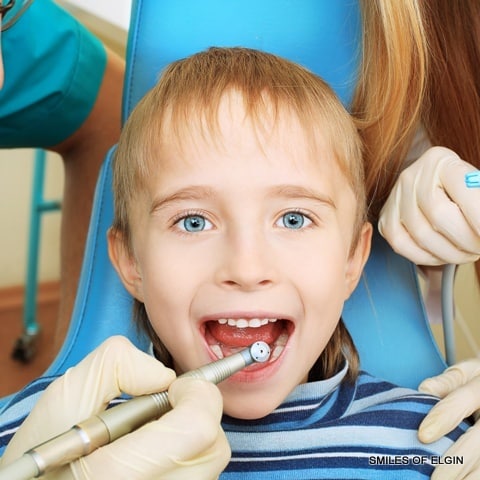1209 Dundee Avenue Elgin, IL 60120
Care for Your Child’s Teeth
Pediatric oral care has two components: preventative care at the pediatric dentist’s office and preventative home care. The goal of preventative oral care is to evaluate and preserve the health of the child’s teeth. Beginning at the age of twelve months, the American Dental Association (ADA) recommends that children begin to visit the pediatric dentist for “well baby” checkups.
How can a pediatric dentist care for my child’s teeth?
Your Elgin dentist examines the teeth for signs of early decay, monitors orthodontic concerns, tracks jaw and tooth development, and provides a good resource for parents. The child’s mouth will be fully examined, the teeth will be professionally cleaned, topical fluoride may be coated onto the teeth and any parental concerns can be discussed.
When permanent molars emerge, the pediatric dentist may coat them with dental sealant. This sealant covers the hard-to-reach fissures on the molars, sealing out bacteria, food particles and acid. Dental sealant may last for a long period of time but it all depends on the oral habits. They are an important tool in preventing and fighting the tooth decay.

How can I help at home?
Good preventative care includes many factors aside from brushing and flossing, and these are:
Diet – Parents should provide children with a nourishing, well-balanced diet. Leave out snacks where possible, and provide the child with non-sugary alternatives
Oral habits – Though pacifier use and thumb sucking generally cease over time, both can cause the teeth to misalign
General oral hygiene – Harmful oral bacteria are transmitted from parent-to-child in certain cases increasing the risk of early cavities and tooth decay. It is advisable to rinse toys and pacifiers with warm water and avoid spoon-sharing wherever possible.
Sippy cup use – Sippy cups are an excellent transitional aid for the baby bottle-to-adult drinking glass period. However, sippy cups filled with milk, breast milk, juice, and sweetened water cause small amounts of sugary fluid to continually be around teeth.
Brushing – Children’s teeth should be brushed a minimum of two times per day using a soft bristled brush and a pea-sized amount of toothpaste. Parents should help with the brushing process until the child reaches the age of seven.
Flossing – Cavities and tooth decay form more easily between teeth. In the beginning, parents should help their child to properly floss as instructed by your pediatric dentist.
Fluoride – Fluoride helps prevent mineral loss and promotes the remineralization of tooth enamel. Too much fluoride can result in fluorosis, a condition where white specks appear on the permanent teeth.
Office Hours
| Monday | 10:00 to 6:00 |
| Tuesday | 10:00 to 6:00 |
| Wednesday | 11:00 to 8:00 |
| Thursday | 10:00 to 6:00 |
| Friday | 10:00 to 6:00 |
| Saturday | 8:00 to 3:00 |
| Sunday | Appointment only |



Recent Comments